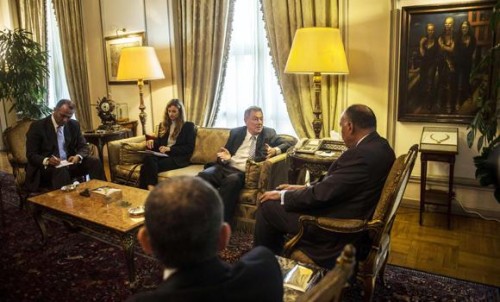UPDATE 1435 GMT: “Sources close to Hamas” say the Palestinian delegation is standing on its conditions for a lifting of the blockade on Gaza, an agreement over the establishment of seaports and airports, and the opening of border crossings.
Egyptian mediators are reportedly attempting to soften the demands: they say that the seaport demand, just like the Israeli demand that Gaza be demilitarized, should be discussed as part of a broader settlement and not as part of a cease-fire deal which also focuses on humanitarian matters.
UPDATE 1405 GMT: Israeli ministers have continued tough talk on Thursday about negotiations with Hamas and other Palestinian groups.
Economy Minister Naftali Bennett warned against any acceptance of Hamas’s conditions: “Today’s concessions are tomorrow’s war. The state of Israel cannot be held hostage by Hamas.”
Finance Minister Yair Lapid warned the Gazan leadership not to break the 72-hour ceasefire:
They mustn’t try us. The Israel Defense Forces are prepared and ready, the air force is prepared and ready. Any fire will be answered with a heavy blow of fire….
Anyone who sits at the head of a murderous terrorist organization deserves to die. Nobody is safe from us.
A commander in the Al-Qassam Brigades, Abu Laith, returns the hard words, saying the military branch of Hamas has “enough rockets, more than the enemy can imagine” to target Israel and claiming the tunnel network has not been entirely destroyed:
We prepared for a long battle. We can target cities we have not even hit in this war. We can penetrate the Israeli border again. We only fought with 10 per cent of our forces, the rest are on standby.
UPDATE 1105 GMT: A public argument has erupted in Israel over a leaked document which indicates that the Netanyahu Cabinet’s reversal, agreeing to talks with Hamas and other Palestinian groups, was prompted by fears of a long-term invasion of Gaza rather than “victory”.
The assessment by Army chiefs to Ministers was that re-occupation of Gaza would take five years to end “terror threats”. In the meantime, operations would cause thousands upon thousands of Palestinian deaths, kill hundreds of Israeli soldiers, devastate the Israel economy devastating effect on the Israeli economy.
Prime Minister Benjamin Netanyahu reportedly asked his ministers if any of them supported re-occupation under these conditions. No hands were raised.
This morning, Tourism Minister Uzi Landau effectively admitted the truth of the leak, while declaring that it was detrimental to Israel’s deterrent capability.
Landau said Hezbollah, Iran, and all other groups hostile to Israel now believe West Jerusalem does not have the will to destroy an organization far less threatening and powerful than they are.
He said that all ministers should be required to take a lie detector test to ascertain the source of the leak, and Netanyahu should be “the first in line”.
UPDATE 0945 GMT: Amnesty International has called for an immediate investigation into ‘mounting evidence’ that Israeli forces deliberately attacked hospitals and health professionals in the Gaza strip.
Amnesty said it had disturbing testimonies from doctors, nurses, and ambulance personnel regarding Israel Defense Forces operations that killed six medics.
Philip Luther, Amnesty’s Middle East and North Africa Director, summarized:
The harrowing descriptions by ambulance drivers and other medics of the utterly impossible situation in which they have to work, with bombs and bullets killing or injuring their colleagues as they try to save lives, paint a grim reality of life in Gaza.
Even more alarming is the mounting evidence that the Israeli army has targeted health facilities or professionals. Such attacks are absolutely prohibited by international law and would amount to war crimes. They only add to the already compelling argument that the situation should be referred to the International Criminal Court.
The UN said on Sunday that 1/3rd of hospitals, 14 primary health care clinics, and 29 Palestinian Red Crescent and Health Ministry ambulances had been damaged in the fighting. At least half of all public health primary care clinics were closed by the conflict.
“Indirect” talks for a lasting ceasefire in the Gaza War began Wednesday in Cairo, with the Egyptians meeting with high-level Israeli officials and the Palestinians adding members to their joint delegation.
No details were released of the discussions. The Palestinians — including the Palestinian Authority, Hamas, and Islamic Jihad — gave proposals to the Egyptian brokers on Monday, which includes conditions such as an end to the Israeli blockade on Gaza and the release of Palestinian detainees from Israel’s prisons.
West Jerusalem has rejected any such conditions, saying that a ceasefire must ensure the demilitarization of Gaza. The Israeli officials — including a close advisor to Prime Minister Benjamin Netanyahu, high-level Defense Ministry official Amos Gilad, and the head of the domestic intelligence service Shin Bet — presented their proposals on Tuesday night.
On Wednesday night, Netanyahu continued to put the burden of war on Hamas. While “deeply regretting” civilian casualties, he said:
90 percent of the fatalities could have been avoided had Hamas not rejected then the ceasefire it accepts now. Hamas needs to be blamed for these deaths, ostracized from the family of nations.
Israel said it would accept an extension of the ceasefire, due to expire at 8 a.m. (0500 GMT) on Friday, but Hamas officials said no agreement had been reached.
Meanwhile, Israeli Foreign Minister Avigdor Lieberman continued to outflank Netanyahu in his criticism of others involved in the attempts to resolve the conflict. Having denounced the Palestinian Authority leader Mahmoud Abbas — a contrast to Netanyahu’s support for Abbas’s participation in the Cairo talks — Lieberman went after the UN on Wednesday. He said that if the UN was doing its jobs, “the organization would organize an international force to remove the terror government of Hamas from Gaza, and wouldn’t wait for Israel to do it”.
(Featured Photo: Egypt’s Foreign Minister Sameh Shukri (right) meets with UN envoy Robert Serry on Wednesday — Khaled Desouki/AFP)

